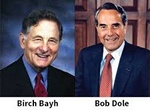
The Bayh-Dole Act was enacted Dec. 12, 1980.
This landmark legislation has ushered in an unprecedented era of commercializing inventions which has spurred job creation, new products in the marketplace and investment in new companies.
Major provisions of the Act include:
- Non-profits, including universities, and small businesses may elect to retain title to innovations developed under federally-funded research programs.
- Universities are encouraged to collaborate with commercial concerns to promote the utilization of inventions arising from federal funding.
- Universities are expected to file patents on inventions they elect to own.
- Universities are expected to give licensing preference to small businesses.
- The government retains a non-exclusive license to practice the patent throughout the world
- The government retains march-in rights in very specific circumstances.
Over the years, various groups have expressed support or questions about the Bayh-Dole Act. The AUTM Public Policy Committee has tried to compile some of that information into
one document of talking points that you may wish to use when speaking with senior university management, legislators, the media, and the general public.
Discover the tangible impact this legislation has had over the past 38 years.